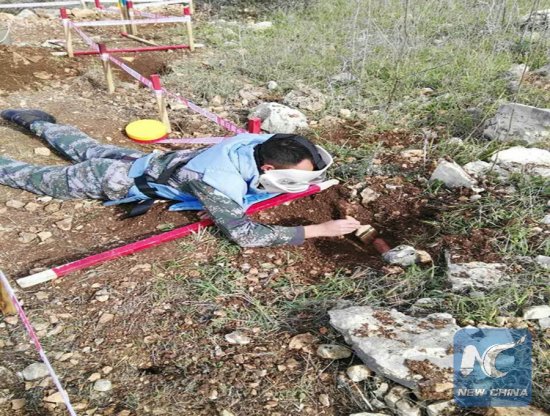
A Chinese peacekeeper in the UNIFIL discovered a mine buried underground along the UN Blue Line between Israel and Lebanon, on Feb. 5, 2018. (Xinhua)
"Even though we were trained in China and (Lebanon), it's normal to be a little afraid. Everyone is at first, but there is a lot of supervision."
Despite his young age, Li is currently serving his second mission in southern Lebanon. He first arrived in 2013 when he was also tasked to clear the land of explosives.
Sitting next to him, 29-year-old Sergeant Jin Wei, who is on his third rotation in Lebanon, nodded his head.
"My parents were worried when I told them what I was doing," Jin told Xinhua.
"But we work very carefully and don't make mistakes."
Lieutenant Colonel Luo Qiang, the head supervisor of CHINBATT's demining team laughed in agreement.
"The Chinese are special," he said proudly noting CHINBATT's clear record of any accidents and injuries since the beginning of their work in 2006.
"We work professionally and we never make mistakes."
Mohammad Rida, a member of the Lebanese Armed Forces tasked to work alongside CHINBATT agreed.
"The Chinese are extremely professional, they work hard and they do a good job."
The task is not easy, and requires meticulous attention to detail. According to maps provided by Israel, the peacekeepers are given rough locations on the whereabouts of mines. Yet weather elements, animals, and people are all capable of unintentionally moving their positions.
"This is why we don't work when it rains," Luo said. "It makes it dangerous when the soil gets wet and the mines can potentially slide around."
Waking up nearly at dawn, they drive to the site about an hour away from the CHINBATT base less than a kilometer away from Israel. Upon arrival, they begin working in sections using a range of tools including larger mine detectors, hand shovels and small brushes to clear away dirt, stones and shrubbery in the area.
After mines are discovered in each section, CHINBATT then informs higher supervisors in UNIFIL who communicate with both the Lebanese Armed Forces and Israeli Army to inform them of planned explosions.
Once approval is received, TNT explosives are wired to each area with found mines and carefully exploded to deactivate the device.


















































